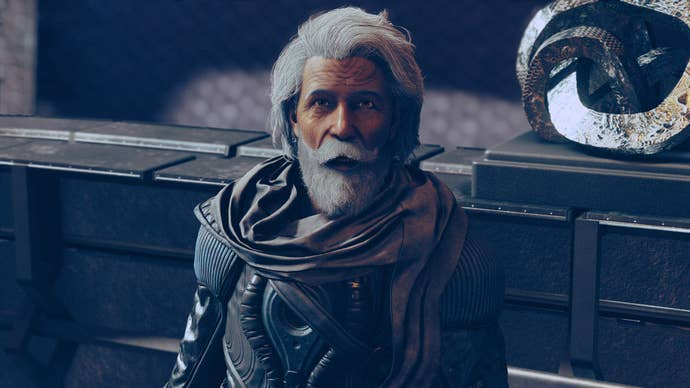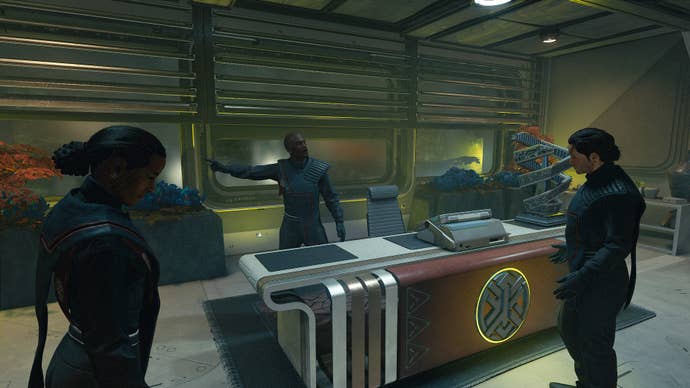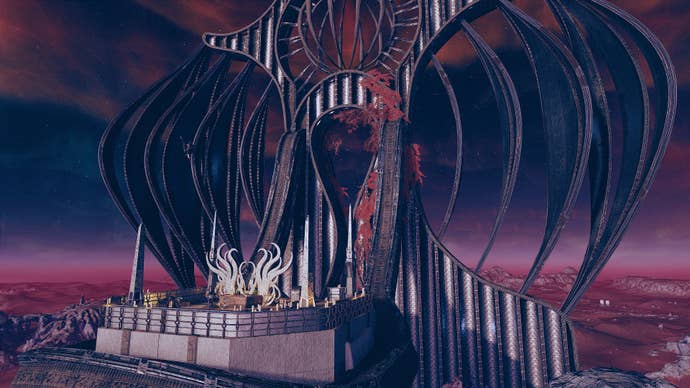The first major expansion for Bethesda’s big space baby isn’t terrible by any means, but it still just feels like more Starfield, for all that that entails.
When I first sat down and really dug into Starfield after it came out last year, I was between jobs.
I had two weeks to interact with the thing as much as I wanted to - this game I’d been looking forward to not necessarily because I was that into the premise, but because of how much I’d dug the previous works of its creators, the people who’d put considerable effort into selling us on their space pipe dream as the next big special thing.
I came out of those two weeks with no idea what to make of the damn thing, on the whole. I’d enjoyed some of it, thought a lot of it fell well short of the lofty expectations set, but even more often than either of those, a lot of it just left me feeling a bit numb.
In the time between then, and Starfield’s first bit of story DLC - Shattered Space - arriving, my thoughts on the base game have, thankfully, crystalised into something vaguely coherent. It’s a game that feels like it’s either a few steps (or a bunch of grav jumps) away from actually achieving its potential.
Shattered Space, unfortunately, is a missed opportunity to finally take that leap from impressive - but often soulless - technical feat to unquestionably great video game that'd mark a true step forward for its creators.
That’s not to say you won’t find things to enjoy in it. From the moment that you find the The Oracle, the space station that kicks off the adventure, to when you land the home planet of House Va’ruun, through when you’ve finished everything the surprisingly small expansion has to offer, there are, as there were in the base game, there are bits of fun to be had. The issue as that they feel like comets of that old Bethesda brilliance in a vacuum of samey stuff that could, with just a bit more depth and original flourish, be a fresher flavour of Bethesda brilliance.
House Va’ruun itself sums it all up. In the run up to Starfield’s original release, I don’t think I was alone in viewing them as sounding like they’d be its most interesting faction. An alien and interesting inclusion that could help to balance out the slightly drier sci-fi that the game was set to pull from as it mixed philosophical questions about a future in the cosmos with an unflinching reverence for the white and grey real-world science of NASA.
 Sadly, this fellow isn't House Va'ruun's version of Santa Claus. | Image credit: VG247/Bethesda
Sadly, this fellow isn't House Va'ruun's version of Santa Claus. | Image credit: VG247/Bethesda
In the base game, it was barely present outside of Andreja’s questline, the void filled by zealots that just felt like the parade of other boring enemies you blasted your way through because it was the thing to do. That was disappointing. But it’s ok, there’s the DLC coming, a chance to do House Va’ruun properly! To actually make the group that worships a giant mythical snake into something wonderful, weird, and interesting. Something memorable. To fully deliver on all the inherent potential of those good ideas.
Instead, Va’ruun’kai generally serves as a beautiful canvas onto which a main narrative that runs into a lot of the same pitfalls which stopped the rest of Starfield hitting the heights it could have. There are some interesting characters, but the ones that get the screen time you’d need to develop into fully-formed personalities that could carry a main questline into show-stealing territory. There are sometimes interesting themes at play in the tale being told, but they’re not properly developed before everything neatly wraps up in pretty brisk fashion.
There are slight re-interpretations of some beats that you’ve seen before, including some which’ve become straight-up Bethesda tropes, not in a beloved ‘wink, wink, nudge, nudge’ way, but in an ‘aw man, we’re doing this again’ way. They’re treating you like a prophesied hero not long after you arrive, because you’re magically the only one who can do a thing - in this case hear a mysterious entity speak. You don’t have any missing relatives this time, but it’s cool, the people of House’ Va’ruun have folks dear to them you’ll need to track down. There’s a big techno gadget that you’ve got to help get up and running, so you can press the big red button on it and pave the way for a big problem to go away. Spoiler alert, but something goes boom in a big way as you watch it do so at the end.
 Stop shouting at me, you're Va'ruuning the vibes. | Image credit: VG247/Bethesda
Stop shouting at me, you're Va'ruuning the vibes. | Image credit: VG247/Bethesda
If these were wrapped in a story that was otherwise doing enough with its fresher elements to get your imagination going and engage you, they wouldn't be a problem, but by and large, I don’t think that’s the case here, certainly not in the macro. As with the base game, there are some points being made about politics and religion in the portrayal of the very traditionalist Va’ruun society, with its one big supreme leader flanked by an ineffective council that can’t agree on how to change a lightbulb, but any messages struggle to properly shine through or work to really convince you that you should change how you view things or explore roleplaying in another way for any reason beyond that it’s your personal whim.
There’s some choice and consequence, but the effects of it feel limited in the short term in terms of making you feel like you’ve made a big impact on the world as a whole, without someone literally telling you ‘bloody well think about this, because it matters’. There’s also no neat little slideshow - even if exposition obviously isn’t an ideal endgame - to show you how you’ve shaped the future of House Va’ruun long-term. In the micro of individual quests, where Starfield’s always done slightly better, there thankfully are some scenarios that can make you care a bit more.
This isn’t to say there isn’t also some evidence of Bethesda trying to improve on the base game’s offerings on the storytelling front. While the early returns are arguably a bit disappointing, bugs aside, I ended up liking the job that was done of making Andreja - the only House Va’ruuner in the base game that was given any real depth - worth bringing along as a companion for the DLC set on her home world. She’s got plenty of unique dialogue and reactions, and occasions where you can opt to let her cut in and speak for you.
She feels invested in what’s going on and offers some good commentary, even if that’s undermined a bit by the fact she suffers from the continuation of the fact the Starfield’s companions struggle to feel like anything more than characters in the player’s story, with very limited ability to do anything dynamic, aside from storming off in a huff if you deliberately tell literally everything they stand for to f**k off in no uncertain terms.
 There's still some cool stuff to find in Shattered Space, like this wonderfully weird-looking shrine. | Image credit: VG247/Bethesda
There's still some cool stuff to find in Shattered Space, like this wonderfully weird-looking shrine. | Image credit: VG247/Bethesda
I also appreciated the fact that Bethesda looks to have used the DLC to experiment with making Starfield’s cutscenes feel a bit more dynamic, even if you’re still stuck in a bubble of bobbing heads that, to be fair, still has that Oblivion charm. I had fun exploring the decently sized - if a bit barren beyond the Va’ruun capital city of Dazra and its immediate outskirts - square that is Va’ruun’kai. The focus on one area has definitely allowed Bethesda to play a lot more to its long-established environment crafting strengths, with a decent amount of interesting architecture in terms of the big shrine landmarks especially, a lot more little unmarked stuff to stumble across, and a colour palette of vibrant purples and oranges that helps bring the landscape to to life visually.
Things are a bit barren when it comes to new items, rather bizarrely given how much Starfield excels in turning you into a hoarder. I had fun blasting through dungeons with some of the Va’ruun guns - the one that fires big electric bolts that explode into balls of energy gets a big thumbs up - and there’s some decent gear, but overall, the lack of uniqueness carries over here.
Things could have been redeemed a bit with some interesting Va’ruun ship habs or additions, but the group only uses and stocks the same parts as the rest of the settled systems. Outpost-wise, things are slightly better, with a couple of new Va’ruun habs unlocking at the end of the main quest, but those look to be the only additions, and don’t look that different to your usual square or circular blocks. Plus, you can’t seem to actually place them of Va’ruun’kai itself, which would have helped matters.
That’s the thing, though. Shattered Space was a chance for Bethesda to do some stuff that’d make quibbling about where you can spend five hours building a little house surrounded by mineral extractors a lot less important than it was in the base game. It was a golden opportunity to take the great ideas Bethesda’d had when devising a faction that’d grabbed players’ attention, and bring them to life with a bunch of either the classic Bethesda magic, or a new mojo that the studio could carry on into the great games it may well add to an already storied legacy in the future.
Instead, anyone returning to Starfield after all the time they’ve spent with what remains a very marmite base game will likely be left feeling much the same way they did about all those hours when they get done playing what could have been a home run return to star form.
Starfield Shattered Space is out now on PC, Xbox and Game Pass. This review was conducted using a PC code provided by the publisher.

 3 months ago
105
3 months ago
105








![Anime Reborn Units Tier List [RELEASE] (November 2024)](https://www.destructoid.com/wp-content/uploads/2024/11/anime-reborn-units-tier-list.jpg)
